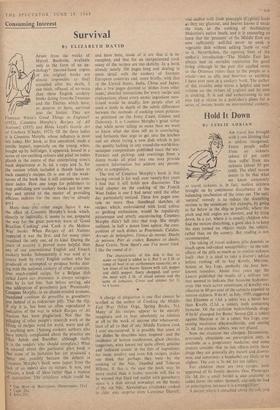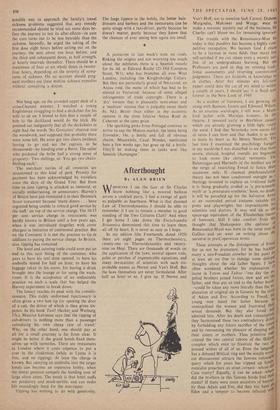Hold It Down
By LESLIE ADRIAN
AIR travel has brought with it one blessing that
is seldom recognised.
Fewer people suffer from air sickness (about 65 per cent) than suffer from sea sickness (about 95 per cent). The chief reason seems to be that what we know commonly
as travel sickness is, in fact, motion sickness
brought on by continuous disturbance of the balancing mechanism of the inner ear. The only 'natural' remedy is to reduce the disturbing motion to the minimum—for example, by going as far below in the ship as possible, where the pitch and roll angles are shortest, and by lying down. In a car, where it is usually children who find the motion disturbing, a good idea is to keep the eyes turned on objects inside the vehicle, rather than on the scenery. But reading is not recommended.
The taking of travel sickness pills depends so much upon individual susceptibility—to the side effects of the pills as much as to motion sickness itself—that it is ideal to take a doctor's advice before rushing off to buy Kwells, Marzine, Sereen or Sea Legs, probably the four best- known remedies. About four years ago the Lancet published the results of a military test that seemed to indicate that hyoscine hydrobro- mide (the main active constituent of Kwells) was effective in 80 per cent of the subjects exposed to motion sickness. Which?, in July. 1959, suggested that Ellanbee at I.6d. a tablet was a better buy than Kwells (2.1d. a tablet), both containing hyoscine. Of the cyclizine hydrochloride drugs Which? plumped for Boots' Screen (2d. a tablet) against Marzine at 3d. a tablet. Sea Legs, con- taining meclozine dihydrochIoride, and costing 2s. 6d. for sixteen tablets. was not placed.
Now the situation has changed. Dramamine, previously obtainable on prescription only, is available as a proprietary medicine, and some doctors consider that its side effects (with these drugs they are generally dry mouth and drowsi- ness, and sometimes a headache) are likely to be slighter. The cost is 3s. 6d. for ten tablets.
For children there are two syrups, both approved of by family doctors. One, Phencrgan (3s. 3d. for a small bottle) is also available in tablet form: the other. Stemetil, can only be had on prescription, because it is a tranquilliser.
A doctor )shom I consulted about the safe and sensible way to approach the family's travel sickness problems suggested that any remedy recommended should be tried out some days be- fore the journey to test its after-effects—in case the cure turns out to be less bearable than the sickness. Secondly, he urged the taking of the first dose eight hours before setting out on the journey; the next about one hour before; and the third and subsequent doses, at half strength, at hourly intervals thereafter. There should be a maximum of four or six whole doses in twenty- four hours, depending on the severity of symp- toms of sickness. On no account should preg- nant mothers use these motion sickness remedies without, consulting a doctor.
Not long ago, on the crowded upper deck of a cross-Channel steamer, I watched a young Englishman struggling to find a deckchair for his wife to sit on. I hinted to him that a couple of bob to the deckhand would do the trick. He pointed out indignantly that all the deckchairs in sight had the words Isio Gratuities' charred into the woodwork, and supposed that probably there were none left. He soon got two chairs (without having to go and see the captain, as he threatened)—by handing over a florin. The sailor who pocketed the bribe had a strong sense of propriety. 'Two shillings, sir. You get two chairs. Shilling each.'
The merchant navies of all countries are accustomed to this kind of perk. Priority for payment has been acknowledged by travellers since the days of the Grand Tour. But from time to time tipping is attacked as immoral, or socially embarrassing, or unnecessary. Harvey's of Bristol have just reinstated it in their Denmark Street restaurant because `many diners .. . have regretted being unable to reward good service by the staff,' on top of the service charge. The 10-15 per cent service charge in restaurants was hardly known in Britain until a few years ago, when it was introduced (together with cover charges) in imitation of continental practice. But on the Continent it is not the practice to tip in addition to paying the service charge. In Britain, alas, tipping has remained.
The hotel and catering trade could soon put an end to this tacit fining of the customer, who pays to have his taxi door opened, to have his umbrella stored for half an hour, to have his luggage taken to his room, for having a drink brought into the lounge or for using the wash- room. It is the acceptance of an undesirable practice on such a scale that has helped the Harvey experiment to break down.
The lunacy reaches its peak with the commis- sionaire. This richly uniformed functionary is often given a two bob tip for opening the door of a cab, the driver of which is then given six- pence. In his book Taxi! (Secker and Warburg, 15s.), Maurice Levinson says that the tipping of - cab-drivers 'is nothing more than a passenger subsidising his own cheap rate of travel.' Why, on the other hand, one should pay at all for a small courtesy is far from clear. It might be better if the grand hotels fixed them-
selves up with turnstiles. There are restaurants in London where it costs sixpence to put a coat in the cloakroom (while at Lyons it is free, and no tipping). At least the charge is known. But carrying an umbrella into the larger hotels can become an expensive hobby, when the moral pressure compels the handing over of large silver coins. The result is that hotel staffs are predatory and mock-servile, and can make life exceedingly hard for the non-tipper.
Tipping has nothing to do with generosity. The large tippers in the hotels, the better hair- dressers and barbers and the restaurants can be quite stingy with a taxi-driver, partly because he doesn't matter, partly because they know that the chances of ever seeing him again are small.
A postscript to last week's note on rosés. Risking the origins and not worrying too much about the Subtleties there is a Spanish rosado for 6s. 6d. at Edward Roche (21 Old Compton Street, WI), who has branches all over West London, including the Knightsbridge Cellars. But they are particularly proud of Nectarose, an Anjou rosé, the name of which has had to be altered to Vectarose, because of some alleged infringement of trade copyright. There is a `dry' version that is pleasantly semi-sweet and a 'medium' version that is palpably sweet (both 8s. 9d.). Better than either in my eccentric opinion is the close Velative Anjou Rose de Cabernet at the same price.
The sparkling pinks from Portugal continue to arrive to sap the Mateus market, the latest being Trovador, 14s. a bottle and full of obvious charm. Meanwhile, Casal Mendes, mentioned here a few weeks ago, has gone up 6d. a bottle. They'll be making them in tanks next like Spanish 'champagne.'































 Previous page
Previous page